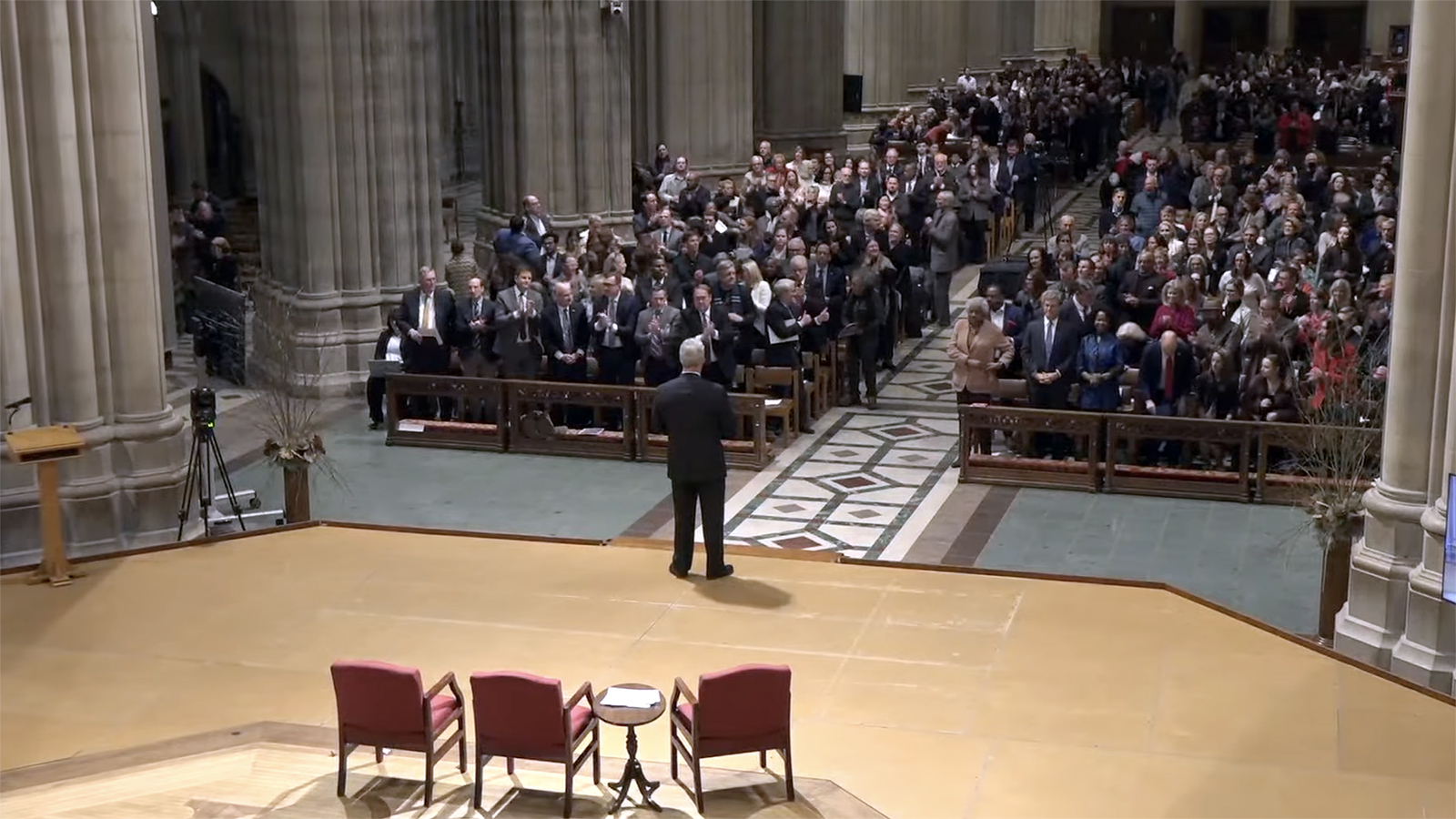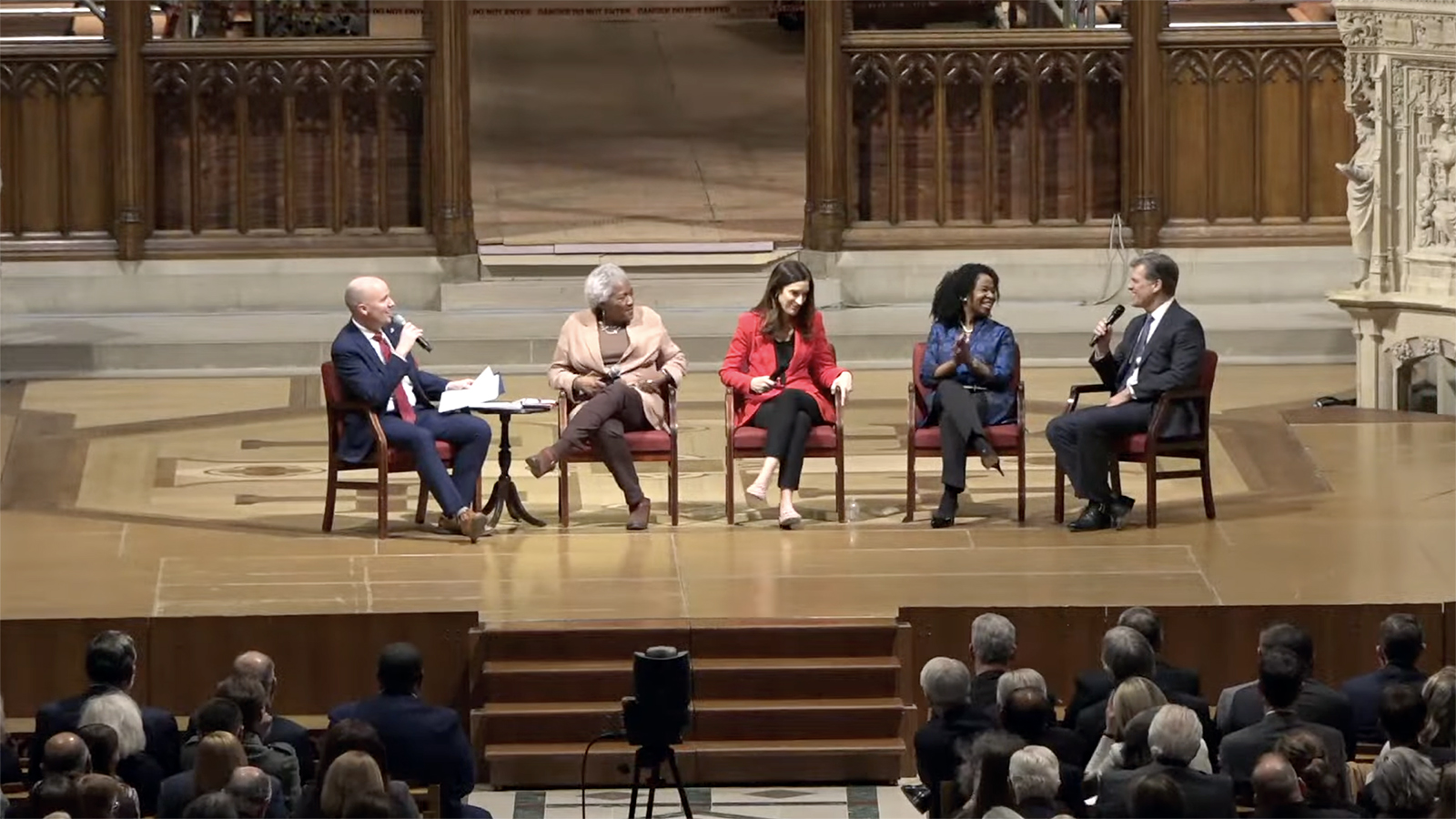WASHINGTON (RNS) — Sitting under the imposing columns of Washington National Cathedral, Utah Gov. Spencer Cox turned to longtime political strategist Donna Brazile and shared his change of heart about her.
“I grew up as a Republican; I grew up watching you on TV, as a Democrat, and there were so many times that I thought: I would love to just argue with her,” he said during a Wednesday (Feb. 21) forum on civility attended by more than 750 people.
“And I finally get up here on stage and I finally get to meet you and I just — I love you and I’m so impressed by you.”
The two were among the speakers at a forum at the cathedral called “With Malice Toward None, With Charity for All: Reclaiming Civility in American Politics.” The event, timed to the start of an already contentious election season, was held in partnership with Wesley Theological Seminary, along with the Wheatley Institute at Brigham Young University and Deseret Magazine, two institutions affiliated with The Church of Jesus Christ of Latter-day Saints.
“As we head deeper into this election year, I can think of few topics more important than
civility and the need for civil discourse in order for our democracy to thrive,” cathedral Dean Randy Hollerith said as the forum began.
He said the cathedral’s programming focus this year on promoting humility, compassion, love and forgiveness should “remind people that even our worst enemies, political or otherwise, are the beloved children of God and should be treated as such.”

Dean Randy Hollerith addresses attendees of the “With Malice Toward None, With Charity for All: Reclaiming Civility in American Politics” program at the Washington National Cathedral, Feb. 21, 2024. (Video screen grab)
RELATED: Preaching to polarized congregations: A responsibility and a challenge, clergy say
Cox is chair of the National Governors Association and, since last year, has spearheaded a “Disagree Better” initiative that includes “interventions,” such as encouraging governors to publish an op-ed with a politician of a different party or colleges hosting a debate on campus that demonstrates ways to handle conflict in a healthy manner.
Cox and Maryland Gov. Wes Moore interviewed each other about their participation in the project and noted their efforts to seek bipartisan solutions in their states despite their party being able to pass legislation without the votes of the minority party.
“I believe in the idea that we don’t have to come all to the same conclusion but everyone just wants to be heard, everyone wants to feel like they were part of a larger process,” said Moore, a Democrat who is the grandson and great-grandson of ministers.
“You can’t claim to love the country if you hate half of the people in it.”
Cox, a member of the LDS church, said his interest in starting the initiative lay in a desire to model behavior that would aim to foster depolarization as he watched a deepening of political divides over the last dozen years.
“Politics was becoming religion for many people and then politics infiltrated their religion, and you started to see that more and more, and I just hated that that’s how we were seeing each other,” he said.
The conversation between Cox and Moore at the cathedral was followed by a panel discussion, facilitated by the Utah governor. Participants included political and legal panelists, such as Brazile, who spoke of the bipartisan work that went into establishing Martin Luther King Jr. Day as a federal holiday, as well as in sending aid to the survivors of Hurricane Katrina.
“The missing ingredient in American politics right now is trust,” added Brazile, a Catholic who said she is “praying for everybody.” “Trust in one another, trust in our institutions, and the belief that we can still get through this.”
Cox asked the panel about approaches to civility, including by faith-based organizations.
“If we don’t encourage and teach and preach and pray and speak about the strength of institutions that can be gathering places for us, then we leave this generation and ourselves with nothing but the contempt and the hate,” said Ruth Okediji, a law professor at Harvard Law School and co-director of Harvard’s Berkman Klein Center for Internet and Society.

Panelists participate in the “With Malice Toward None, With Charity for All: Reclaiming Civility in American Politics” program at the Washington National Cathedral, Feb. 21, 2024. (Video screen grab)
She said there need to be alternatives to the “idols” of hate that can lead to clicks and followers on social media.
“There’s a place and a way of living that does not require you to debase yourself or your neighbor. These institutions are important, vitally important, because they give us hope.”
In a later discussion, between Joshua DuBois, a Pentecostal minister who became executive director of the Office of Faith-Based and Neighborhood Partnerships during Barack Obama’s presidency, and Peter Wehner, a Trinity Forum fellow and former speechwriter for three Republican administrations, the two agreed that civility does not mean people should keep silent so as not to offend their listeners.
“We’ve got to find that sweet spot where you can still speak lovingly but prophetically when you see something that you just know in your gut is wrong,” said DuBois of preachers and other people of faith, citing the example of King’s critique of white moderates in his “Letter from Birmingham Jail.”
“I think we need an active, a lived civility that is not quiet, that doesn’t take a back seat but leans into the healing of this country.”
Wehner, a Protestant who identifies as a former evangelical and a “politically homeless” conservative, added that civility includes listening and refusing to speak in dehumanizing ways.
“I think that the confusion that there is with civility is that it is synonymous with lack of conviction, that it’s devoid of principles and it’s always backing down — I really don’t think that that is what civility means,” he said. “But you can’t give up on justice at the altar of civility and you certainly can’t, as a person of religious faith, do that.”
On Friday, during the National Governors Association’s winter meeting in Washington, Cox is set to continue his efforts toward civility.
He is scheduled to host a discussion with U.S. Supreme Court Justices Sonia Sotomayor and Amy Coney Barrett on “How to Disagree Agreeably.”
RELATED: This Lent, take up some practices that counter the worst of our politics